- Home
- Priscilla Royal
The Proud Sinner
The Proud Sinner Read online
The Proud Sinner
A Medieval Mystery
Priscilla Royal
www.PriscillaRoyal.com
Poisoned Pen Press
Copyright
Copyright © 2017 by Priscilla Royal
First E-book Edition 2017
ISBN: 9781464207280 ebook
All rights reserved. No part of this publication may be reproduced, stored in, or introduced into a retrieval system, or transmitted in any form, or by any means (electronic, mechanical, photocopying, recording, or otherwise) without the prior written permission of both the copyright owner and the publisher of this book.
The historical characters and events portrayed in this book are inventions of the author or used fictitiously.
Poisoned Pen Press
6962 E. First Ave., Ste. 103
Scottsdale, AZ 85251
www.poisonedpenpress.com
[email protected]
Contents
The Proud Sinner
Copyright
Contents
Dedication
Acknowledgments
Epigraph
Chapter One
Chapter Two
Chapter Three
Chapter Four
Chapter Five
Chapter Six
Chapter Seven
Chapter Eight
Chapter Nine
Chapter Ten
Chapter Eleven
Chapter Twelve
Chapter Thirteen
Chapter Fourteen
Chapter Fifteen
Chapter Sixteen
Chapter Seventeen
Chapter Eighteen
Chapter Nineteen
Chapter Twenty
Chapter Twenty-one
Chapter Twenty-two
Chapter Twenty-three
Chapter Twenty-four
Chapter Twenty-five
Chapter Twenty-six
Chapter Twenty-seven
Chapter Twenty-eight
Chapter Twenty-nine
Chapter Thirty
Chapter Thirty-one
Chapter Thirty-two
Chapter Thirty-three
Chapter Thirty-four
Chapter Thirty-five
Chapter Thirty-six
Author’s Notes
Bibliography
More from this Author
Contact Us
Dedication
To Paula Mildenhall, my Australian friend,
who owns a heart as big as her wonderful country.
Acknowledgments
Patrick Hoi Yan Cheung, Christine and Peter Goodhugh, Maddee James, Henie Lentz, Dianne Levy, Paula Mildenhall, Sharon Kay Penman, Barbara Peters (Poisoned Pen Bookstore in Scottsdale, Arizona), Robert Rosenwald and all the staff of Poisoned Pen Press, Marianne and Sharon Silva, Lyn and Michael Speakman, the staff of the University Press Bookstore (Berkeley, California).
Epigraph
Fair is foul, and foul is fair,
Hover through the fog and filthy air.
—Witches, Macbeth, Act 1, Scene 1, 1.10-11
Chapter One
Two women knelt in silence before Prioress Eleanor, heads bowed. One wore a diaphanous veil that obscured her face. The other suffered a ragged scar that cut through her lips.
The prioress gave her blessing and bid them rise.
“To what do we owe the honor of this visit, my lady?” Anchoress Juliana raised her veil as she stood. Although her cheeks were hollowed by habitual fasting, the wounds from the time when she beat her head against the stones of her enclosure walls were long healed.
The other woman remained kneeling while a heavily pregnant cat rubbed against her legs. Reaching out, she stroked the purring creature.
“I see that my Arthur has visited once again,” Eleanor said, looking at the cat’s rounded belly.
“Or one of his sons,” the anchoress replied. “The females come here so Eda can ease their birthing.” She turned and gently touched the woman’s shoulder.
Eda blushed but said nothing.
“I have come to seek your advice,” the prioress said to the anchoress, a woman whom many called holy.
Juliana tilted her head and waited, her expression warm with affection. Although their journeys to their chosen vocations had taken very different paths, she and Prioress Eleanor had been friends since childhood.
“It is about Gracia. The time has come for her to decide whether to stay in our priory and take vows, or to seek the secular life. She has not yet spoken to me of her choice, or requested my advice, but the moment for either will come soon.”
The anchoress concurred.
“Before it arrives, I need your counsel and beg for wisdom to guide me in helping Gracia make the best decision. You would have a better understanding of her needs and wishes, for I can think only with my selfish heart in this matter.”
Eda glanced up, first at the prioress and next at the woman she served. Her eyes asked a question she otherwise left unspoken.
Eleanor saw her expression and read its meaning.
Sitting back on her heels, Eda waited and held the rumbling cat close to her chest.
“I have no wish to pry into confidences between friends,” Eleanor said to the anchoress’ maid. “I only seek to understand what Gracia truly longs for. It is her happiness I care most about and not my own desires.”
Gazing with fondness on her servant, Juliana’s eyes asked permission to share some of what she had told her about Gracia.
Eda hesitated, then nodded and rose, releasing the cat from her arms. Walking a short distance, she stood by the heavy wooden door that opened into a world she still visited but which her mistress had utterly rejected.
The cat saw a fleeing shadow on the floor and with a rumble of joy gave awkward chase into the shadows of the simple altar.
“Come with me,” Juliana said to the prioress and gestured toward a smaller door that led beyond the small quarters in which she and Eda lived.
Eleanor followed.
***
The garden outside was surrounded by a high stone wall, glistening with rills of ice. The ground was covered with fresh snow. Although the plot grew many vegetables and herbs in the warm seasons, the wintering earth was as hard as a devil’s heart. The soft whiteness masked its current barrenness; a few mounds suggested that the garden was simply hiding while it patiently waited for its imminent resurrection.
In the far corner, there was a small stone bench, but the two women chose to walk.
The air was bitter cold.
Eleanor looked up. The grey sky was fading into a mist that threatened to shatter into snowflakes. Although the late afternoon light was growing pale, it shone with weak determination on a tiny part of the wall and gave a fragile beauty to those rivulets frozen in place before they could escape the chill.
“Does Eda ever speak?” Eleanor asked.
“Once or twice she has tried, and I welcome it when she does. The effort shows a regained trust, but I never demand she speak.” Juliana scowled with a rare anger. “I pray daily to God that He will forgive her parents for the agony they inflicted on their daughter. In truth, I believe they did so out of love and sought only to cure her of her faltering speech.”
Eleanor winced. How could a child endure the pain of a burning iron pressed against her lips? A respected physician advised that remedy for Eda’s stuttering, but her parents could only bear her screams so long before her father snatched the iron from the doctor’s han
ds and flung both it and the tormenter from the house. After that day, however, Eda refused to utter any words.
“I pray for her cure as well, but until God chooses the time for that mercy, she and I converse in gestures. For other needs that suit our life in the anchorage, we continue to develop special signs.”
“And Gracia has learned this hand speech,” Eleanor said. “She told me.”
“Each loves the other with the devotion of a sister, my lady.” Juliana looked up at the vanishing sky and held out a hand to catch any tiny flakes.
There were no harbingers.
“Gracia and Eda have suffered profoundly from the cruelty of life,” the anchoress added softly, “but have found comfort for their pain in each other and at the priory.”
Eleanor did not question her observation or conclusion. Anchoress Juliana had had come to her vocation suffering deep wounds inflicted by the world and understood the anguish well.
In silence, they continued on their circular path, now blackened where their pacing had melted the snow and exposed the soil beneath. The earth remained unyielding and crunched in protest under their light weight. The sharp air had whipped their faces into a pink glow, even the anchoress’ sallow cheeks.
“You say that Eda has found peace at Tyndal, yet she has not taken vows.” Might Gytha follow that path? Eleanor wondered.
“She has no wish to go back to her family,” Juliana replied. “I remain patient and trust God to guide her.”
“Her family aside, has she ever expressed a desire to leave our priory for a worldly life?”
The anchoress shook her head. “What has the world to offer her? No man would marry her. The fearful have always mocked her. She has no siblings or other kin. After her parents die, she would be alone, reduced to begging on the road to Norwich or even whoring.”
The prioress shivered, but the cold was not the reason. “After Gracia’s family died of a fever, she was left to beg in Walsingham and raped before she had even reached womanhood. Eda must know this tale and have learned from it. Do you think the two have discussed the future and their choices?”
“I do not know, my lady, but it is likely. Indeed, I wonder if they could bear to be parted. Perhaps their mutual confidences and experiences are leading them…” Juliana stopped and looked toward the door to the anchorage.
Eda stepped into the garden and raised a hand to catch the anchoress’ attention. Lifting both hands over her head, she acted as if she were ringing a church bell, then put one hand to her mouth. With the other, she extended her hand, palm up, toward the prioress as if begging a mercy.
“Eda says that a messenger has come for you and waits in the chapel outside the anchorage door,” Juliana said. “I fear it is a matter of some urgency.”
Concerned, Eleanor hurried inside. When she reached the solid oaken door that was the only entrance from the world to the walled-in anchorage, she waited for the maid to unlock the barrier. As Prioress of Tyndal, she had a key to this place but chose to honor the terms of Juliana’s entombment and never used it. Only Eda possessed the other key to allow her entrance and egress so she might provide whatever was needed to serve her holy mistress.
The maid inserted the key and opened the door.
Eleanor quickly slipped through and into the Lady Chapel outside.
The door slammed shut behind her with a purposeful thud and a loud click as the key was turned.
Brother Beorn, a lay brother, stepped into sight, his face pale with worry. “My lady, you must come immediately! A party of seven abbots has arrived, and one is gravely ill. Prior Andrew is with them.”
Seven abbots, one sick? Eleanor felt a foreboding, an unease she had not suffered in a long time. “Summon Sister Anne and one of the healing brothers from the hospital to attend the sick man,” she said. “Next, gather some of the lay brothers and swiftly prepare the new guest quarters for our visitors. Since the attached kitchen must also be made ready to serve its first meal, send word to Sister Matilda that she will be required to perform one of her miracles and increase the amount of our own supper tonight to feed the abbots and their servants.”
Brother Beorn inclined his head, then swiftly left to do her bidding.
As she hurried to the courtyard, Prioress Eleanor prayed for the sick abbot’s recovery and caught herself begging God not to bring her priory more than it could bear. But an ominous chill had settled into her soul, and she feared her plea would be denied.
Chapter Two
Sister Anne watched two lay brothers ease Abbot Ilbert onto the bed. Dire though his illness seemed, she would not touch him nor stand too close. God must take a hand in healing, she thought, for she had no choice but to honor the spirit of the vows both the abbot and she had taken.
He moaned.
She dared to step nearer.
His eyes were wide with terror, or so she first concluded, but then she saw that his pupils were extremely dilated. A white froth coated his lips.
Ordering one of the lay brothers to the sick man’s side, she told him to place one hand on the abbot’s forehead and another on his chest.
“He has no fever,” the lay brother said. “His heart is pounding rapidly.”
Sister Anne was perplexed and prayed the abbot could answer questions. “Are you able to describe your suffering?” she asked gently while fearing any explanation was beyond his strength.
“A priest. I want a priest,” Ilbert mumbled and twisted his head to stare at the wall. “Get thee hence, Whore of Babylon!”
The sub-infirmarian stepped back, saying to the lay brother, “There must be a priest in the party of abbots but send for Brother Thomas as well. I need his keen observations.”
The young man hurried away.
She motioned to the thin man who had followed Abbot Ilbert to this room after helping him down from his horse. If he is the abbot’s servant, she thought, perhaps he can give me vital details. If I am to treat this man properly, I must quickly determine the nature of this troubling sickness. “You came to Tyndal Priory because your master was ill. Please describe his symptoms. When did he first appear unwell?”
The man glanced anxiously at his prone master as if hoping for guidance in how he should reply. Realizing nothing would be forthcoming, he clutched his hands nervously. “I fear I can tell you little enough, Sister. Soon after we left the inn, where we spent last night, he complained of feeling weak.” He lowered his voice. “Twice along the road, we were obliged to stop because he suffered an urgent need to urinate. But he could not do so and groaned as if in pain, although he refused to speak of it. When we approached the village of Tyndal, he announced he was too sick to ride further. We were most fortunate that the Abbot of Caldwell knew of your priory hospital and led us to your gate.”
Sister Anne was not pleased when she heard the abbot could not pass water, and she prayed he did not have a blockage. The man was skeletally thin, but that could be caused by fasting and not a cancer. “Had he been unable to urinate before this journey?”
The man again looked to the abbot, his eyes begging for orders and direction. “Not to my knowledge,” he whispered, “but I have not been long in his service.”
“You mentioned he seemed in pain on the journey. Do you know if the pain came in waves? Did he indicate by any means where he felt it? ”
If the cause was stones, they might still pass, or so she hoped. If not, treatment might require a procedure she could not perform. Although some swore by black cumin to dissolve the stones, she had never known that to work. Physicians often inserted fingers into the rectum to feel for the stone and try to squeeze it out. Surgery was the last resort, as men often died from it. Yet stones were preferable to a growth that blocked the urine. For that, there was no cure.
The thin man waved his hand vaguely around his own abdomen but denied being aware of anything more specific.
�
��Is there anyone in your party in whom he confides? I am not asking to learn about the man’s sins but rather the details of his mortal ills.”
The man squared his shoulders. “As Abbot Ilbert often proclaims, he looks only to God for comfort and advice. Mortals might lead him to sin rather than salvation. His faith is his only companion, and his confidences are solely for God.”
Loyally spoken, she thought, but most unhelpful. Shutting her eyes to hide her frustration, she asked if the abbot had recently vomited or complained of nausea. She was not surprised when the servant said he did not know.
Noticing that the abbot’s eyes were shut, Sister Anne walked away from the servant and slowly approached the bed until she was close enough to observe Ilbert more clearly.
The servant gasped as if terrified that she might do something to sully his master’s chastity, but he also seemed reluctant to criticize a nun.
Taking pity on the frightened man, Sister Anne assured him that she had taken the same vows as the abbot and understood how far she must stand away from the bed to honor both words and intent.
He gulped and commenced sweating.
She did not move from her spot and began to study the abbot for clues to his illness.
Ilbert’s hands were swollen, she noted, which would suggest kidney disease. But she needed to know if there had been a history of his complaints. If he had vomited or ever complained of pain specific to a part of his body, for instance, she might find a clue to the illness. Although this servant had not been with Abbot Ilbert long, he should have noticed something if this onset of illness was not sudden. Surely another servant would have mentioned ongoing sufferings to this unhelpful man? If the condition was sudden, these symptoms were even more troubling, as was the foam now bubbling around his mouth.
Not daring to step closer to the patient, she spoke to the lay brother who had come with her from the hospital. “Examine him as best you can, Brother, and note anything that suggests how his humors might have become unbalanced.”
The lay brother walked toward the bed.

 The Twice-Hanged Man
The Twice-Hanged Man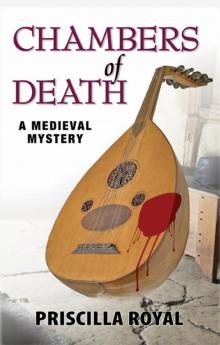 Chambers of Death mm-6
Chambers of Death mm-6 Forsaken Soul
Forsaken Soul Covenant With Hell (Medieval Mysteries)
Covenant With Hell (Medieval Mysteries)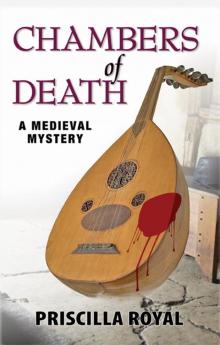 Chambers of Death
Chambers of Death Tyrant of the Mind
Tyrant of the Mind Wild Justice
Wild Justice Sorrow Without End
Sorrow Without End Wine of Violence
Wine of Violence Tyrant of the Mind mm-2
Tyrant of the Mind mm-2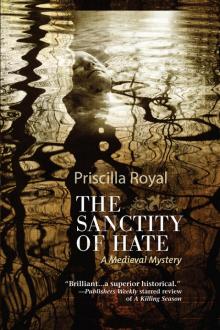 The Sanctity of Hate
The Sanctity of Hate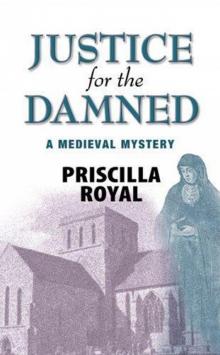 Justice for the Damned
Justice for the Damned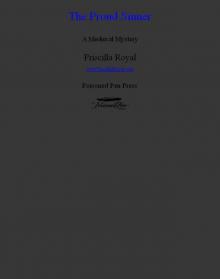 The Proud Sinner
The Proud Sinner A Killing Season mm-8
A Killing Season mm-8 Forsaken Soul mm-5
Forsaken Soul mm-5 Valley of Dry Bones mm-7
Valley of Dry Bones mm-7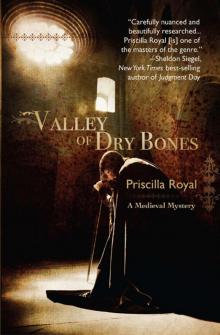 Valley of Dry Bones
Valley of Dry Bones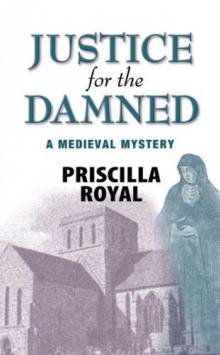 Justice for the Damned mm-4
Justice for the Damned mm-4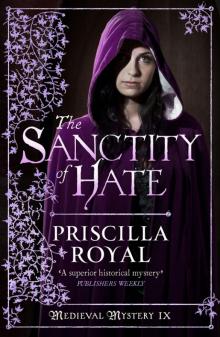 Sanctity of Hate
Sanctity of Hate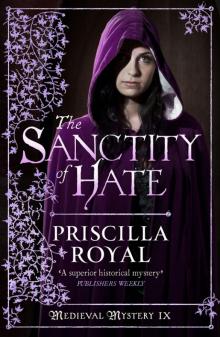 Sanctity of Hate mm-9
Sanctity of Hate mm-9 Wine of Violence mm-1
Wine of Violence mm-1